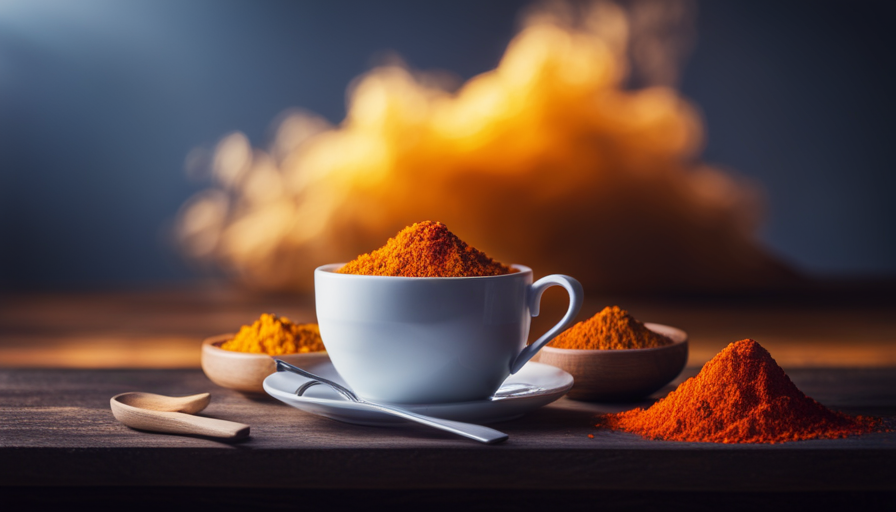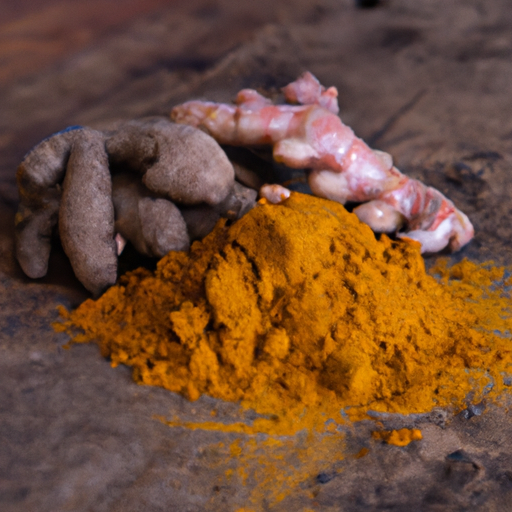If you are fed up with inflammation and seeking a natural remedy, you’re in luck! Turmeric tea is becoming increasingly popular for its potential anti-inflammatory benefits and could be the solution you’ve been seeking.
This golden-hued beverage has been used for centuries in traditional medicine and is known for its vibrant flavor and numerous health benefits. But how much turmeric tea should you drink to effectively combat inflammation?
In this article, I will guide you through the recommended dosage of turmeric tea for inflammation and provide you with evidence-based tips to maximize its benefits. While there is no one-size-fits-all answer, I will help you find the right balance for your needs.
From consulting with healthcare professionals to considering the quality of turmeric, we will explore various factors that can influence the effectiveness of turmeric tea in reducing inflammation.
So, grab your favorite mug, and let’s dive into the world of turmeric tea and its potential to alleviate inflammation.
Key Takeaways
- Turmeric tea contains curcumin, which has anti-inflammatory properties.
- Consuming 500-2,000 milligrams of curcumin per day can reduce inflammation.
- Consulting with a healthcare professional is crucial for determining the right dosage.
- Start with a small amount of turmeric tea and gradually increase dosage over time to minimize potential side effects.
Understand the Benefits of Turmeric Tea for Inflammation
If you’re looking for a natural way to combat inflammation, you’ll be amazed at the benefits of turmeric tea! Turmeric contains a compound called curcumin, which has been found to have anti-inflammatory properties. When consumed as a tea, curcumin can help reduce inflammation in the body.
Understanding the dosage of turmeric tea for inflammation is important. While there’s no specific recommended dosage, studies have shown that consuming 500-2,000 milligrams of curcumin per day can be beneficial for reducing inflammation. However, it’s important to note that the amount of curcumin in turmeric can vary, so it’s best to check the label or consult with a healthcare professional for guidance on the appropriate dosage.
It’s also worth mentioning that turmeric tea may have some possible side effects. These can include digestive issues such as nausea or diarrhea, and allergic reactions in some individuals. If you experience any of these side effects or have any concerns, it’s always a good idea to consult with a healthcare professional before starting or changing any herbal remedies.
Turmeric tea can be a great natural option for reducing inflammation. However, understanding the appropriate dosage and possible side effects is crucial. It’s always a good idea to consult with a healthcare professional for personalized advice and guidance.
Consult with a Healthcare Professional
To gain a better understanding of the appropriate amount to consume, it’s advisable to consult with a healthcare professional. Seeking healthcare advice and professional guidance is crucial when determining the right dosage of turmeric tea for inflammation. A healthcare professional can provide personalized recommendations based on your specific health condition and needs.
When discussing turmeric tea dosage with your healthcare provider, keep in mind the following points:
-
Medical history: Your healthcare professional will take into consideration your medical history to determine the appropriate dosage. Certain health conditions or medications may require adjustments in the amount of turmeric tea you should consume.
-
Severity of inflammation: The severity of your inflammation will also play a role in determining the appropriate dosage. Your healthcare provider will consider the level of inflammation and recommend an amount that suits your condition.
-
Individual tolerance: Everyone’s body reacts differently to substances, and turmeric tea is no exception. Your healthcare professional will take into account your individual tolerance to turmeric and adjust the dosage accordingly.
Consulting with a healthcare professional is crucial for determining the right dosage of turmeric tea for inflammation. This will help ensure that you’re consuming an appropriate amount that’s safe and effective for your specific needs. Moving forward, it’s important to start with a low dosage to assess your body’s response to the tea.
Start with a Low Dosage
When starting to incorporate turmeric tea into my routine for inflammation, I began with a small dosage. I wanted to gauge how my body would react to it and ensure there weren’t any adverse effects.
Over time, I gradually increased the amount of turmeric tea I consumed, allowing my body to adjust and reap the potential benefits.
Begin with a small amount of turmeric tea
Starting with a small amount of turmeric tea is a great idea to gradually introduce its benefits for inflammation. Turmeric, a spice commonly used in Indian cuisine, contains a compound called curcumin, which has anti-inflammatory properties.
By starting small, you can assess how your body responds to turmeric tea and make adjustments accordingly. It’s important to note that everyone’s tolerance varies, so what works for one person may not work for another.
Begin by brewing a cup of turmeric tea using half a teaspoon of powdered turmeric. Pay attention to any changes in your body, such as reduced pain or improved mobility. If you experience positive effects, gradually increase the dosage over time to maximize the benefits. Remember, finding the right amount for you is a process of trial and error.
Gradually increase the dosage over time
As you increase the dosage of turmeric tea over time, you’ll be able to fully harness its powerful anti-inflammatory properties. Gradually increasing the amount of turmeric tea you consume allows your body to adapt and minimize any potential side effects. It’s important to listen to your body and find the right dosage that works best for you. To help you track your progress, consider using the following table:
| Week | Dosage (teaspoons) | Frequency (times per day) |
|---|---|---|
| 1 | 1/4 | 2 |
| 2 | 1/2 | 2 |
| 3 | 1 | 2 |
| 4 | 1 | 3 |
Remember, everyone’s body is different, so you may need to adjust the dosage and frequency based on your individual needs and tolerance. As you increase the speed at which you consume turmeric tea, it’s also helpful to explore alternate methods of incorporating turmeric into your diet, such as adding it to smoothies or sprinkling it on roasted vegetables. Considering the quality of turmeric is the next important aspect to consider when harnessing its anti-inflammatory benefits.
Consider the Quality of Turmeric
To truly experience the benefits of turmeric tea for inflammation, it’s crucial to savor the aroma and taste of high-quality turmeric. When it comes to turmeric quality, it’s important to choose a reputable brand that sources its turmeric from trusted suppliers.
Look for turmeric that’s certified organic, non-GMO, and free from additives or fillers. This ensures that you’re getting the purest form of turmeric with maximum potency.
Dosage accuracy is another key consideration when using turmeric for inflammation. It’s recommended to follow the dosage instructions provided by the manufacturer or consult with a healthcare professional for personalized guidance. The dosage may vary depending on factors such as your overall health, the severity of inflammation, and any other medications you may be taking.
By using high-quality turmeric and following the recommended dosage, you can maximize the anti-inflammatory benefits of turmeric tea. This powerful spice contains curcumin, a compound known for its potent anti-inflammatory properties. Incorporating turmeric tea into your daily routine can help reduce inflammation and promote overall wellness.
To further enhance the effectiveness of turmeric tea, it’s important to use the right preparation method. Stay tuned to the next section to learn about the proper techniques for brewing turmeric tea and extracting its beneficial compounds.
Use the Right Preparation Method
For optimal results in harnessing the anti-inflammatory benefits of turmeric, it’s crucial to ensure that the preparation method of your turmeric tea is done correctly. The way you prepare your tea can greatly affect the bioavailability of the active compounds in turmeric, such as curcumin, which is responsible for its anti-inflammatory properties.
Here are some preparation techniques and brewing methods to consider:
-
Heat it up: Curcumin is more soluble in hot water, so it’s best to brew your turmeric tea using boiling water.
-
Add a pinch of black pepper: Black pepper contains piperine, a compound that enhances curcumin absorption. Adding a pinch of black pepper can significantly increase the bioavailability of curcumin.
-
Include some healthy fats: Curcumin is fat-soluble, meaning it needs fats to be properly absorbed by the body. Adding a teaspoon of coconut oil or a dash of almond milk can help improve curcumin absorption.
By following these preparation techniques and brewing methods, you can maximize the potential anti-inflammatory benefits of turmeric tea. Remember to pay attention to your body’s response, as everyone’s tolerance and sensitivity to turmeric may vary. This will help you determine the right amount of turmeric tea to drink for inflammation relief.
Pay Attention to Your Body’s Response
Listen closely to how your body reacts, as each individual may have a unique response to incorporating turmeric into their routine. Pay attention to any signals that your body may be giving you after consuming turmeric tea, especially in relation to inflammation.
While some people may experience relief from inflammation after just one cup of turmeric tea, others may require more to notice a difference. It’s important to listen to your body and adjust the amount of turmeric tea accordingly. If you start to notice a reduction in inflammation, you may want to continue with the same amount of turmeric tea. On the other hand, if you don’t see any improvement, you may want to increase the dosage gradually.
It’s always a good idea to consult with a healthcare professional or a registered dietitian before making any significant changes to your diet or incorporating new supplements.
By paying attention to your body’s response to turmeric tea, you can determine the optimal amount that works for you.
As we move forward, let’s aim for a balanced diet that complements the benefits of turmeric tea.
Aim for a Balanced Diet
Maintaining a well-rounded and diverse diet is key to maximizing the benefits of incorporating turmeric into your routine. While turmeric tea can be a valuable addition to your anti-inflammatory regimen, it’s important to remember that it shouldn’t be the sole focus of your diet. Aim for a balanced diet that includes a variety of fruits, vegetables, whole grains, lean proteins, and healthy fats.
Following nutritional guidelines can help ensure that you’re getting all the necessary nutrients to support overall health and well-being.
When it comes to incorporating turmeric tea into your diet, moderation’s key. While there’s no specific recommendation for how much turmeric tea to drink for inflammation, it’s generally safe to consume one to three cups per day. However, it’s always important to pay attention to your body’s response. If you experience any adverse effects or discomfort, it’s best to consult with a healthcare professional.
A balanced diet that follows nutritional guidelines is crucial for maximizing the benefits of turmeric tea. By incorporating a variety of nutritious foods into your daily meals and paying attention to your body’s response, you can ensure that you’re providing your body with the necessary nutrients to support overall health.
Stay consistent with your turmeric tea consumption to continue reaping its potential benefits.
Stay Consistent with Your Turmeric Tea Consumption
Consistently sipping on turmeric-infused tea can be a warm and comforting ritual that nourishes your body with its potential benefits. When it comes to turmeric tea consumption for inflammation, maintaining dosage consistency is key. It’s important to establish a routine and stick to it, as the anti-inflammatory properties of turmeric may take time to build up in your system.
To experience the health benefits of turmeric tea, it’s generally recommended to consume 1-3 grams of turmeric per day, which is equivalent to ½ to 1½ teaspoons of ground turmeric. However, it’s important to note that individual responses to turmeric may vary, and consulting with a healthcare professional is advisable to determine the optimal dosage for your specific needs.
Incorporating turmeric tea into your daily routine can provide relief from inflammation over time, but it’s important to remember that turmeric is just one piece of the puzzle. To effectively manage inflammation, it’s essential to consider other factors that may contribute to it, such as diet, exercise, stress levels, and underlying health conditions. By addressing these factors holistically, you can further support your body’s natural healing processes.
Transition: Taking all these factors into account, let’s now explore how considering other aspects of your lifestyle can help manage inflammation more effectively.
Consider Other Factors that Affect Inflammation
When it comes to managing inflammation, it’s important to stay consistent with your turmeric tea consumption. However, it’s also crucial to consider other factors that can affect inflammation in your body. Turmeric tea can be a great addition to your daily routine, but it isn’t a magic cure-all.
Other factors, such as diet, exercise, and stress levels, play a significant role in inflammation. Eating a balanced diet rich in fruits, vegetables, and whole grains can help reduce inflammation. Regular exercise has also been shown to have anti-inflammatory effects. Additionally, managing stress through techniques like meditation or deep breathing exercises can help lower inflammation levels.
Understanding that turmeric tea is just one piece of the puzzle is important for long-term effects on inflammation. Incorporating these other lifestyle factors alongside regular consumption of turmeric tea can lead to a more comprehensive approach to reducing inflammation in your body.
So, be patient and give it time. In the next section, we’ll discuss the importance of allowing your body to adjust and the potential benefits of turmeric tea in the long run.
Be Patient and Give It Time
Take a moment to be patient and give your body the time it needs to adjust to the potential benefits of incorporating turmeric tea into your daily routine.
When it comes to managing inflammation, it’s important to remember that everyone’s body is different and the response to turmeric tea may vary. It’s not a quick fix, but rather a long-term approach to reducing inflammation.
In terms of dosage adjustment, it’s always best to start with a small amount and gradually increase as needed. This allows your body to adapt and helps you gauge the optimal dosage for your specific needs. It’s recommended to start with one cup of turmeric tea per day and then slowly increase to two cups if desired.
Pay attention to any changes in your body, such as improvements in inflammation symptoms or any potential side effects. If you experience any adverse reactions, it’s important to consult with a healthcare professional.
Remember, Rome wasn’t built in a day, and the same goes for managing inflammation. It may take some time for the anti-inflammatory properties of turmeric tea to show their full effect. So be patient and consistent with your turmeric tea consumption, and over time, you may start to notice a reduction in inflammation and an overall improvement in your well-being.
Frequently Asked Questions
Can I drink turmeric tea if I have a medical condition or take medication?
Yes, you can drink turmeric tea if you have a medical condition or take medication. However, it’s important to consult with your healthcare provider first. Turmeric tea has potential benefits for conditions like high blood pressure and diabetes. Studies suggest that turmeric’s active compound, curcumin, may help reduce inflammation and improve blood sugar control. Nevertheless, individual responses may vary, and your healthcare provider can provide personalized advice based on your specific medical condition and medications.
Can turmeric tea help with other health issues besides inflammation?
Turmeric tea offers a range of health benefits beyond just inflammation. It’s been shown to aid digestion, boost the immune system, and improve skin health. Additionally, turmeric tea is rich in antioxidants and has anti-inflammatory properties, which can help protect against chronic diseases. To harness these benefits, you can try different turmeric tea recipes, such as golden milk or turmeric ginger tea. Enjoy a cup and reap the potential health benefits!
How long does it typically take to see the effects of turmeric tea on inflammation?
The effects of turmeric tea on other health conditions may vary depending on individual factors. However, studies have shown that turmeric has anti-inflammatory properties, which may help alleviate symptoms over time. It’s recommended to consume 1-2 cups of turmeric tea per day for maximum anti-inflammatory benefits. It’s important to note that consulting with a healthcare professional is advised to determine the appropriate dosage for your specific needs.
Are there any potential side effects or risks associated with drinking turmeric tea?
Turmeric tea, a golden elixir, is renowned for its potential anti-inflammatory properties. However, it’s crucial to consider potential side effects. While generally safe, excessive consumption may lead to digestive issues like diarrhea or nausea.
Additionally, turmeric can interact with certain medications, so it’s wise to consult a healthcare professional before making it a daily habit. Overall, moderation is key when enjoying the benefits of this ancient spice.
Can I combine turmeric tea with other natural remedies or supplements to enhance its anti-inflammatory effects?
Combining turmeric tea with other natural remedies and supplements can potentially enhance its anti-inflammatory effects. Some natural remedies that work well with turmeric tea for inflammation include ginger, cinnamon, and black pepper. These ingredients have their own anti-inflammatory properties and can complement the benefits of turmeric tea.
Additionally, certain supplements like fish oil and curcumin capsules may also help in reducing inflammation when taken alongside turmeric tea. However, it’s always advisable to consult with a healthcare professional before combining any natural remedies or supplements.
Conclusion
In conclusion, incorporating turmeric tea into my daily routine has been a game-changer in managing inflammation. It’s like a soothing balm for my body, quelling the fire within.
Consulting with a healthcare professional and starting with a low dosage ensured I found the right balance. Choosing high-quality turmeric and using the proper preparation method maximized its benefits.
By staying consistent and maintaining a balanced diet, I’ve seen remarkable improvements. So, be patient, give it time, and let this golden elixir work its magic.










